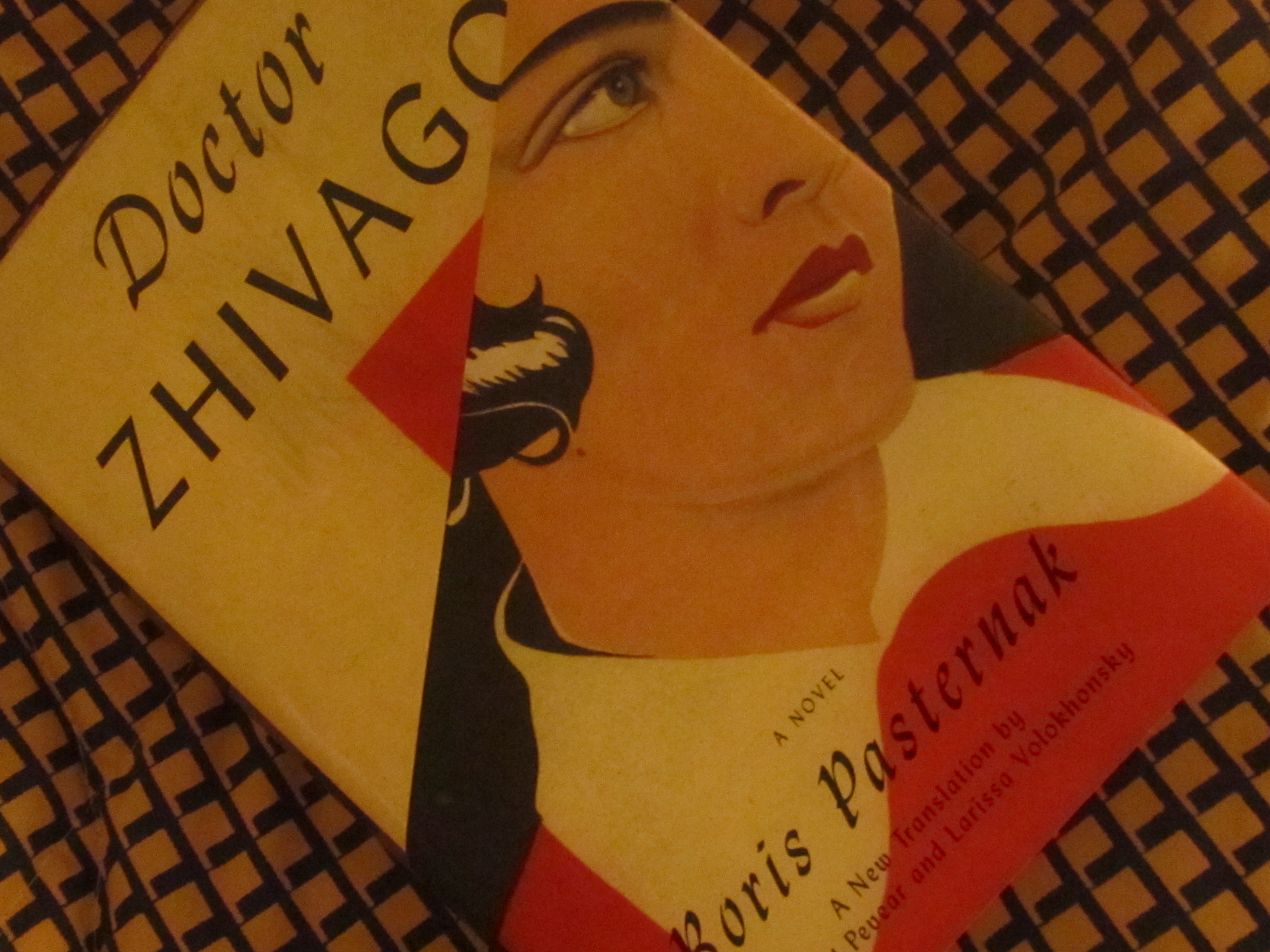You have no items in your cart. Want to get some nice things?
Go shoppingOf course you know Dr Zhivago. You’ve seen the film. Admirable in many ways, the film isn’t the book, and never could be. There’s too much in the book. It’s a poet’s novel, a novel rich in language (so difficult to translate), a narrative of the seasons and the landscapes of Russia, a story in which the Revolution is a living presence rather than an impersonal force. It shapes the lives of the characters. Their personal desires and needs are not met in a private, domestic enclosure. Their lives are lived through the Revolution in all its possibilities, in all its actualities.
How do you dramatize that? You recreate the narrative, as Robert Bolt did. You can’t adapt it, lifting the scenes from the page and enacting them. Highly readable, Dr Zhivago evades adaptation. Versions of Shakespeare that lose the language lose the essence of Shakespeare. It’s the same with Pasternak. So it comes as little surprise that his translations of Shakespeare are strikingly successful. The only thing to do is to return to the novel. Even if Pasternak’s subtle, allusive prose is problematic for the translator, the versions we have give us something of the genius of Pasternak. And Zhivago is readable in a way that the great narratives are. It makes demands, but these are rewarded.
Because it concerns the Revolution there always been a problem for the Western mind to receive the book as it was written. Peter Fleming, travelling through the Soviet Union in the Thirties, observed how everything he had read, favourable or unfavourable, was distorted and prejudiced. Actually observing the society in its extraordinary transformations was rare. Pasternak’s characters live those transformations. Making sense of the changes in human terms is the purpose of the novel. Fiction was the medium for such a work. Poetry is crystalline, compacted and governed by imagery. The metaphors of fiction are found within the developments of character.
After a brief prelude of childhood, the narrative gains momentum at the time of the abortive 1905 revolution. A medical student in Moscow, Zhivago, attends an attempted suicide of a woman whose daughter, Larissa Fydorovna, has shot her lover (a rich man also involved with the mother). It happens that Zhivago is also present at the shooting which takes places separately at a party. The medical student qualifies, marries, and writes poetry.
The Zhivago poems included as an appendix are among Pasternak’s finest. It may be a failing that they are not integrated into the body of the narrative. They are set apart, easily ignored by those readers who simply want a story of romantic love in a time of war. Pasternak was a Romantic, but not in any debased sense. His sensibilities owe much to earlier Russian writers, notably Pushkin, writers who are discussed in the novel, and whose influence is evident, especially in Zhivago’s responses to landscape as he journeys across the Urals into Siberia.
The Revolution is changing the way people live. Initially enthusiastic, the doctor begins to doubt the course the Revolution is taking after the Bolsheviks come to power. Lacking civic traditions, Russia is in chaos. There is no structure to replace the old feudal rule. Order can be imposed only by strict regulation. The fear is that the energy and generosity of the Revolution will be lost in the new disciplines of social control. What Zhivago regrets most is the erosion of independence of mind.
The fanatical adherence to rule is personified by the enigmatic revolutionary, Strelnikov, a sort of Grand Inquisitor, who interviews Zhivago en route to refuge in Siberia. Streklnikov, it turns out, is actually the estranged husband of Larissa Fyodorovna. She is someone whom Zhivago has encountered twice before –as the girl who shoots her lover, and as the woman who acts as a nurse at the field hospital where Zhivago practises during the War.
But they are not lovers until well over half the book is written. Forget Lara’s Theme. This is an account of love which rises above trite feelings. It is not a question of individuals who prefer each other’s company to the collective struggle. It is about the transcendence of human love. Consider Lara’s declaration that the love Zhivago and she felt was above the Revolution. It was not necessarily against it, but it rose above it.
I suspect that was the pivotal passage leading to refusal of publication by the Soviet Writers’ Union. For Pasternak there was a higher reality than the immediate and tangible actuality of existence. This was anathema to an ideology that believed that, for all the mistakes and crimes, it was in essence the highest truth. Lara regards Strelnikov, no longer the man she once knew, as cold as stone in the purity of his ideals that lead him to act without feeling for the lives of others. The humanity in which Strelnikov believes is an abstraction. He is cold and hard. His revolution is at the bottom of its possibilities.
For Lara it is the lack of humanity that destroys the possibilities. For Zhivago it is the absence of a metaphysic, of speculative enquiry beyond immediate realities. Zhivago saw the Revolution atrophy into a literalist application of a materialism that Marx himself may have found excessive.
Arguably, Pasternak may be writing with hindsight. He had lived through the history. But it seems that Pasternak had dissented from the course of Soviet history even before the iron fanaticism of the Stalin years. Some parts of Zhivago were sketched in the years before 1917. As early as 1931 he was writing (in The Last Summer) nostalgically of life before the Revolution. But, of course, he had every right to doubt the course of history, given the things he had witnessed.
Nostalgia, however, is purely sentimental. Love is a creative process. Transcending the actual events of history is more truly revolutionary than misreading the nature of society. There is a love of humanity, and of nature that transcends the harsh and confusing reality of actual experience.
The influence of Tolstoy is evident. Comparisons with Anna Karenina are almost too obvious to articulate. There is the same passion that overwhelms mere individuals so that they collide with social expectations and obligations. There is the same affinity with the natural world, and with the work that is undertaken to harness nature to human advantage. There is the same idealism for the Revolution whose dawn is better than the cold light of morning. What distinguishes Pasternak is that he is writing after the events. Tolstoy died an hour or so before dawn. Pasternak lived to see hopes rise, fade, be crushed, only to rise again.
Zhivago was offered for publication during the Thaw that followed Kruschev’s uncompromising denunciation of Stalin. The refusal to publish serves as a paradigm of the Thaw, and, eventually, of the Soviet Union itself. Thus far and no further was the watchword. Pasternak went to the wire.
What distinguishes Zhivago is its adoption of a noble style, with its echoes, perhaps, of Dante. Pasternak said that subject matter was secondary. The primary quality of a writer is style. Style without substance is simply show, of course, but a writer of any standing has depth which style enhances.
That Zhivago is a poet as well as a man of science, is not chance. There is something perhaps of Pasternak himself. But Zhivago is more akin to the poet who wanders into a dark wood. Zhivago indeed does wander into a dark wood at the point where he escapes from the partisans so that he may find Lara again. Whether Pasternak had Dante in mind is a matter of conjecture. The Zhivago poems, which form the appendix to the novel, memorably evoke Hamlet. That may be more of a clue to Pasternak’s conception of his hero.
The novel is heroic. It is beautifully written. That much is clear even in the translations which fail to convey the richness of Pasternak’s prose. This novel’s great flaw is its use of coincidence. It is a failing in many novels, not least in Dickens. The plot is contrived so that, for example, the man responsible for the death of Zhivago’s father is the teenage Lara’s lover. In the vast space of Russia, at the centre of momentous events, Zhivago meets, or hears of people, as if he were walking through a village. But without such contrivance there would be no novel. The loss would be incalculable. We have yet to understand and assess the years of the great and sometimes terrible Soviet experiment. Without testaments like this we are bereft of the means to encounter a history of hope and the violation of hope. It takes a great poet to lead us through heaven or hell, and to know the difference when we see them.

About Geoffrey Heptonstall
Geoffrey Heptonstall is a poetry reviewer with The London Magazine. Recent creative work includes poetry for Dead Ink, The English Chicago Review, International Literary Quarterly, London Grip, Message in a Bottle, The Passionate Transitory, The Recusant and three anthologies, Connection, In on the Tide and Underground. There is recent fiction for Open Wide, Vintage Script and Writers’ Hub. New essays for Cerise Press and New Linear Perspectives are published this year. Geoffrey’s recent theatre writing includes a play, Providence, published in The Lampeter Review.





